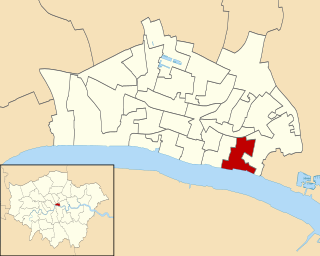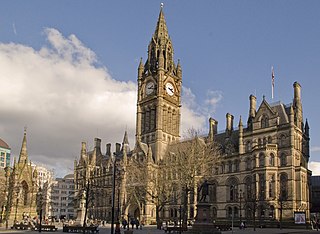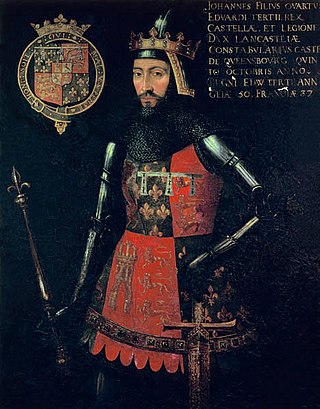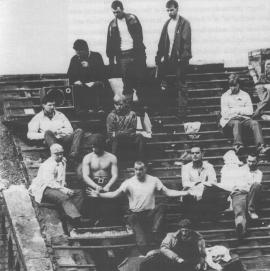Related Research Articles

Billingsgate is one of the 25 Wards of the City of London. This small City Ward is situated on the north bank of the River Thames between London Bridge and Tower Bridge in the south-east of the Square Mile.

Strangeways, Here We Come is the fourth and final studio album by the English rock band the Smiths. It was released on 28 September 1987 by Rough Trade Records, several months after the group disbanded. All of the songs were composed by Johnny Marr, with lyrics written and sung by Morrissey.

Henry "Orator" Hunt was a British radical speaker and agitator remembered as a pioneer of working-class radicalism and an important influence on the later Chartist movement. He advocated parliamentary reform and the repeal of the Corn Laws. He was the first member of parliament to advocate for women's suffrage; in 1832 he presented a petition to parliament from a woman asking for the right to vote.

Boddingtons Brewery was a regional brewery in Manchester, England, which owned pubs throughout the North West. Boddingtons was best known for Boddingtons Bitter (Boddies), a straw-golden, hoppy bitter which was one of the first beers to be packaged in cans containing a widget, giving it a creamy draught-style head.

The Manchester Assize Courts was a building housing law courts on Great Ducie Street in the Strangeways district of Manchester, England. It was 279 ft (85 m) tall and from 1864 to 1877 the tallest building in Manchester. Widely admired, it has been referred to as one of Britain's 'lost buildings'. It was severely damaged by wartime bombing in the Manchester Blitz, and then the remains were demolished in 1957.

HM Prison Manchester is a Category A and B men's prison in Manchester, England, operated by His Majesty's Prison Service. It is still commonly referred to as Strangeways, which was its former official name derived from the area in which it is located, until it was rebuilt following a major riot in 1990.

"I Started Something I Couldn't Finish" is a song by the English rock band The Smiths, written by singer Morrissey and guitarist Johnny Marr and released on the group's 1987 album Strangeways, Here We Come. Featuring a glam rock-inspired guitar riff, the song emerged from a jam during the "Sheila Take a Bow" sessions.

The architecture of Manchester demonstrates a rich variety of architectural styles. The city is a product of the Industrial Revolution and is known as the first modern, industrial city. Manchester is noted for its warehouses, railway viaducts, cotton mills and canals – remnants of its past when the city produced and traded goods. Manchester has minimal Georgian or medieval architecture to speak of and consequently has a vast array of 19th and early 20th-century architecture styles; examples include Palazzo, Neo-Gothic, Venetian Gothic, Edwardian baroque, Art Nouveau, Art Deco and the Neo-Classical.

The High Sheriff of Lancashire is an ancient officer, now largely ceremonial, granted to Lancashire, a county in North West England. High Shrievalties are the oldest secular titles under the Crown, in England and Wales. The High Sheriff of Lancashire is the representative of the monarch in the county, and is the "Keeper of The King's Peace" in the county, executing judgements of the High Court through an Under Sheriff.

The 1990 Strangeways Prison riot was a 25-day prison riot and rooftop protest at Strangeways Prison in Manchester, England. The riot began on 1 April 1990 when prisoners took control of the prison chapel, and quickly spread throughout most of the prison. The incident ended on 25 April when the final five prisoners were removed from the rooftop. One prisoner was killed during the riot, and 147 prison officers and 47 prisoners were injured. Much of the prison was damaged or destroyed, with the cost of repairs coming to £55 million. It was the longest prison riot in British penal history.

Sir James Strangeways was Speaker of the House of Commons of England between 1461–1462. and a close political ally of Edward IV's Yorkist faction.

Francis Reynolds-Moreton, 3rd Baron Ducie was a British Royal Navy officer, peer and politician who participated in numerous engagements during the American War of Independence. He is largely noted for his role conflict at the Battle of Red Bank in 1777 during the Philadelphia campaign, involving the dual siege of Fort Mifflin and Fort Mercer. During this operation he was commander of the advance fleet on board HMS Augusta in an attempt to clear the way along the Delaware to Philadelphia. His ship ran aground while being pursued by Commodore Hazelwood's fleet when the vessel mysteriously caught fire shortly thereafter and exploded before all of the crew could abandon ship. Reynolds also commanded HMS Jupiter and HMS Monarch in several operations and saw service against the French in the North Sea, European Atlantic coast and the Caribbean theaters.

Jonathan Neil Reynolds is a British politician who is currently serving as Shadow Secretary of State for Business and Trade. A member of Labour Co-op, he has also been Member of Parliament (MP) for Stalybridge and Hyde since 2010.
The High Sheriff of Leitrim was the British Crown's judicial representative in County Leitrim, Ireland from c.1582 until 1922, when the office was abolished in the new Free State and replaced by the office of Leitrim County Sheriff. The sheriff had judicial, electoral, ceremonial and administrative functions and executed High Court Writs. In 1908, an Order in Council made the Lord-Lieutenant the Sovereign's prime representative in a county and reduced the High Sheriff's precedence. However the sheriff retained his responsibilities for the preservation of law and order in the county. The usual procedure for appointing the sheriff from 1660 onwards was that three persons were nominated at the beginning of each year from the county and the Lord Lieutenant then appointed his choice as High Sheriff for the remainder of the year. Often the other nominees were appointed as under-sheriffs. Sometimes a sheriff did not fulfil his entire term through death or other event and another sheriff was then appointed for the remainder of the year. The dates given hereunder are the dates of appointment. All addresses are in County Leitrim unless stated otherwise.
Lieutenant-Colonel Francis Hale Rigby was a British politician who sat in the House of Commons from 1779 to 1784.

Strangeways Research Laboratory is a research institution in Cambridge, United Kingdom. It was founded by Thomas Strangeways in 1905 as the Cambridge Research Hospital and acquired its current name in 1928. Organised as an independent charity, it was historically funded primarily by the Medical Research Council and is currently managed by the University of Cambridge, also its sole trustee. Formerly a site of research on rheumatic arthritis and connective tissue disorders, it has since 1997 focused on the study of genetic epidemiology.

The following is a timeline of the history of the city of Manchester in north west England.
Strangeways is an area of inner north Manchester, England, around Strangeways Prison just north of the city centre.
Dugdale Stratford Dugdale (1773–1836) was a Member of Parliament for Warwickshire from 1802 to 1831.
References
- 1 2 "REYNOLDS, Francis (d.1773), of Strangeways, Manchester, Lancs". The History of Parliament. Retrieved 20 September 2022.
- ↑ "Long Lost Histories: Strangeways Hall, Manchester". If These Walls Could Talk. 6 December 2016. Retrieved 30 September 2022.
This article needs additional or more specific categories .(September 2022) |